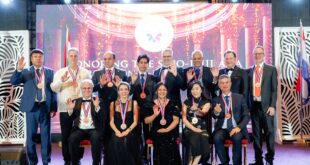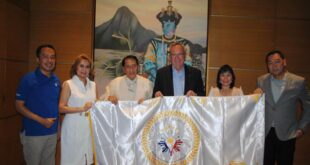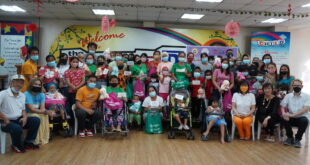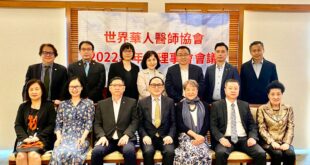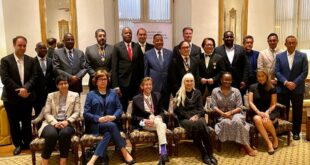Leading Chinese medical mind lauded for trauma rescue efforts
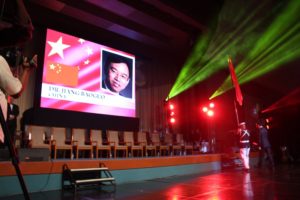
Text: By Christopher Cottrell / Photo Credit: Christopher Cottrell
For the People’s Republic of China, the 2nd Sino Asia-Pacific Medical Forum held in Manila and Macau in recent days carried particular pride. Because it was graced by Dr. Jiang Baoguo, president of Peking University People’s Hospital in Beijing. Dr. Jiang is acclaimed for his traffic and trauma treatment plans, which are saving untold numbers of lives across China. His rescue and response teams are in operation already in 30 Chinese cities, with more than 100 poised to go into service next year.
In an exclusive interview, Dr. Jiang said of the Sino Asia-Pacific Medical Fourm, “I think this is very good. It gives every doctor a chance to give their presentation on their works and for exchanging information. This is very good and important to build relationships with each other. For example, doctors from different departments that might not meet, that might never have a chance to meet, or to exchange ideas, come together. This forum is very open with high levels of exchange.”
For his high-levels of science, Dr. Jiang elaborated on how his traffic rescue and trauma medicine model functions. In essence, the program sets an administrative area to cover a population of 1 to 3 million people as a regional unit. This is set in a top hospital with five to six trauma care hospitals nearby. From this belt, they establish a loop of regional evaluation, triage, treatment, and transport procedures to get patients to the nearest center on time. Strengthening coordination and communication between pre-hospital and in-hospital staffs is of paramount importance.
Dr. Jiang’s closed loop rescue system is based on five principles. It creates regional trauma care system with different levels. Secondly, it utilizes professional pre-hospital, ER, and in-hospital rescue teams. Thirdly, it requires that standardized severe trauma rescue procedures be set in motion and followed. Fourthly, it employs an integrative regional trauma rescue information system. Lastly, it is sustained with training courses for the severe trauma rescue teams.
The set-up of the rescue teams is three fold. The pre-hospital rescue teams can conduct first-aid, CPR, and bleeding control, for example. The second thing it needs is an ER team for life support operations. Lastly, it requires an in-hospital severe trauma rescue team that includes ER, orthopaedic trauma, thoracic surgery, urology, anesthesiology, and ICU. The team must be vetted in trauma rescue with professional training and be on call 24-hours a day.
Dr. Jiang noted, “The model already is a success. Next we must promote this model to more cities in China. We have already designed some for more than 100 counties and smaller cities around China next year. It is very easy to replicate the model. Of course, this also suitable to other developing countries. They don’t need a lot of money for this. They just need to change their teams in the general hospital and change their communications. It is very easy to do that.”
Dr. Jiang added, “ I hope other country’s governments, especially at the city level, if they need this program or design, I will send it to them.”
Launched in Manila and Macau in November 2015 with the singing of a joint communiqué by former Portuguese general and president Eanes, it is organized by the Sino-Asia Pacific Medical Forum Committee, and the Macau Healthcare Management and Promotion Association (MHMPA). It is also done with the friendship of the Gusi Peace Prize International, whom has been a good partner. This medical forum coincides with peace award ceremonies because strong healthcare brings well-being to peoples’ everyday lives.
Commenting on the forum’s title umbrella of, “Building a Regional and International network in Promoting Healthcare and Skills” the president of Sino Asia-Pacific Medical Forum, Prof. Manson Fok, commented, “The purpose this year is to emphasize the importance of collaborations and to build long-term relationships with all out health stakeholders. This symposium will provide medical professionals with essential medical and surgical knowledge.”
Prof. Fok, who is also the Dean of the Faculty of Health Sciences at the Macau University of Science and Technology (MUST), further stated, “Together we can really change the scenery because around us there are still so many diseases and illnesses that we really need to put our heads together and change and improve the healthcare for our citizens.”
Vice President of the forum, Dr. Billy Chan, commented, “The Philippines has been a wonderful neighbor, and a great friend in Asia for centuries. Last year when we were here, the Philippines and China were at the lowest point in their relationship ever. Who could have imagined that after 12 months that things would turn around so beautifully.”
In the past year the forum launched a special initiative between doctors in Macau and Cambodia. In February 2016, Prof. Fok and Dr. Billy Chan visited rural clinics in Cambodia and learned in particular about the plight women face in healthcare. In May, the Honorable Linda Yim, chair of the Union Youth Federations of Cambodia (UYFC), and the Honorable Cambodia Secretary of State for Industry Sokkung Heng, came to Macau and signed an MOU with the Faculty of Health Sciences at MUST regarding medical cooperation. While in Macau, Hon. Yim and Hon. Heng were welcomed by the Foreign Affairs Commissioner, the Honorable Ye Dabo.
The Sino Asia-Pacific Medical Forum looks forward to doing more work with Prof. Jiang and his team at Peking University.
 Peace Post Asia Healthier News For The World
Peace Post Asia Healthier News For The World
